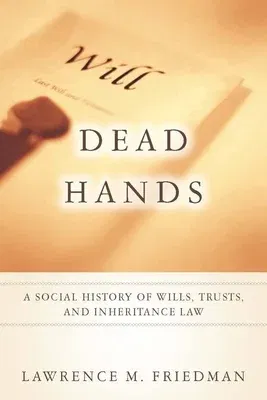Lawrence M Friedman
(Author)Dead Hands: A Social History of Wills, Trusts, and Inheritance LawPaperback, 9 March 2009

Qty
1
Turbo
Ships in 2 - 3 days
In Stock
Free Delivery
Cash on Delivery
15 Days
Free Returns
Secure Checkout

Print Length
240 pages
Language
English
Publisher
Stanford Law Books
Date Published
9 Mar 2009
ISBN-10
0804762090
ISBN-13
9780804762090
Description
Product Details
Author:
Book Format:
Paperback
Country of Origin:
US
Date Published:
9 March 2009
Dimensions:
22.61 x
14.99 x
1.52 cm
ISBN-10:
0804762090
ISBN-13:
9780804762090
Language:
English
Location:
Stanford, CA
Pages:
240
Publisher:
Weight:
317.51 gm